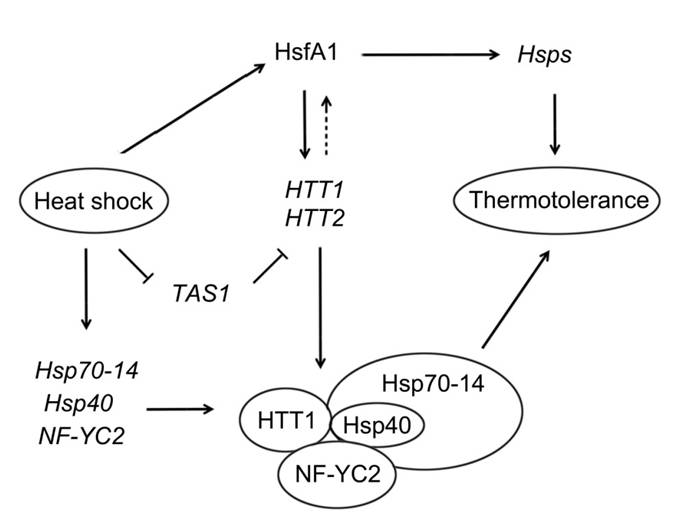植生所在Plant Cell发文揭示HsfA1a调控HTT参与高温胁迫响应的机制

图注:HsfA1a调控HTT参与高温胁迫响应的机制
高温胁迫严重影响了作物的生长发育,是作物稳产高产的主要威胁,提高作物的抗热性是农业生产所面临的紧迫课题。植物对高温胁迫的响应是一个涉及多信号途径、多基因调控的复杂过程。 植物体类多种热激蛋白(Hsp)是已知的高温胁迫响应蛋白,热激转录因子(Hsf)是一类已知的有抗热功能的基因。然而这些Hsfs和Hsps调控途径中的关键因子知之甚少。
该研究组长期以来利用模式植物拟南芥和大白菜、青菜等蔬菜作物为研究对象,克隆和研究植物中有潜在利用价值的小RNA和抗热基因,探索作物不同品种抗热性变异的遗传基础。作者发现,TAS1-siRNAs的两个靶基因HTT1和HTT2受高温胁迫诱导表达,在拟南芥中降低或提高HTT基因的表达水平均影响植物的抗热性,而过表达TAS1基因可下调HTT基因的表达,减弱转基因植物的抗热性。
进一步研究发现,热激转录因子HsfA1a可直接结合在HTT基因的启动子上,从而激活后者的转录,影响植物抗热性。同时HTT1蛋白与Hsp70-14、NF-YC2以及Hsp40等热激蛋白存在直接相互作用,形成复合体介导植物高温胁迫响应。另一方面,Hsf家族基因的表达还受到HTT基因的正调控,形成级联放大效应,促使植株在短时间内响应高温胁迫。该研究组还在大白菜上研究了HTT基因的抗热作用,发现HTT基因的表达调控机制不同于拟南芥。
该工作得到国家重点基础研究发展计划(973计划)的资助。
原文摘要:
Shuxia Li, Jinxin Liu, Zhongyuan Liu, Xiaorong Li, Feijie Wu and Yuke He
Many heat stress transcription factors (Hsfs) and heat shock proteins (Hsps) have been identified to play important roles in the heat tolerance of plants. However, many of the key factors mediating the heat response pathways remain unknown. Here, we report that two genes, which are targets of TAS1 (trans-acting siRNA precursor 1)–derived small interfering RNAs that we named HEAT-INDUCED TAS1 TARGET1 (HTT1) and HTT2, are involved in thermotolerance. Microarray analysis revealed that the HTT1 and HTT2 genes were highly upregulated in Arabidopsis thaliana seedlings in response to heat shock. Overexpression of TAS1a, whosetrans-acting small interfering RNAs target the HTT genes, elevated accumulation of TAS1-siRNAs and reduced expression levels of the HTT genes, causing weaker thermotolerance. By contrast, overexpression of HTT1 and HTT2 upregulated several Hsf genes, leading to stronger thermotolerance. In heat-tolerant plants overexpressing HsfA1a, the HTT genes were upregulated, especially at high temperatures. Meanwhile, HsfA1a directly activated HTT1 and HTT2 through binding to their promoters. HTT1 interacted with the heat shock proteins Hsp70-14 and Hsp40 and NUCLEAR FACTOR Y, SUBUNIT C2. Taken together, these results suggest that HTT1 mediates thermotolerance pathways because it is targeted by TAS1a, mainly activated by HsfA1a, and acts as cofactor of Hsp70-14 complexes.
标签: 高温胁迫 植物抗热基因家族 HTT HsfA1a
作者:植生所

